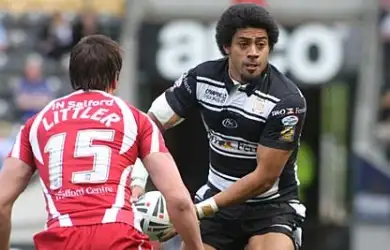Manu selection a kick in teeth for youngsters

It was meant to be about Steve McNamara bringing together a group of players to bond ahead of the Four Nations Down Under this autumn.
Instead, it has turned in to a discussion about the possible selection of Tongan second-rower Willie Manu in the England squad, despite him having represented his country of birth six times.
The Hull man qualifies through the residency ruling, in the same way that Samoan forward Maurie Fa’asavalu did in recent seasons.
But with the licensing system supposedly introduced to encourage the development of young, English players, the selection of a 30-year-old foreign forward has angered a large number of fans, particularly as McNamara is meant to be preparing for an assault on the 2013 World Cup, which of course is to be held in this country (by which time Manu will be 33).
It’s a kick in the teeth for the likes of Joel Tomkins, who has been in excellent form in helping Wigan to the top of Super League this season. Even his team-mate, young Liam Farrell, could argue that he would benefit more from being part of any train-on squad than Manu, as he certainly has the potential to make a claim for a World Cup spot in 2013.
The disappointment in the decision isn’t necessarily a criticism of Manu, a strong-running, fierce tackling forward who has offered excellent service to both Castleford and Hull, but of the whole way international rugby league has shaped itself.
Lesser nations find themselves plugged with Englishmen, Australians or Kiwis who are unable to get in to their first choice nation, but manage to find a way of appearing for the secondary nation. Even France, who took part in the Four Nations last season, have turned to the likes of Australian full-back Clint Greenshields to bolster their ranks.
But even worse than that is the situation that enables players to seemingly pick and choose the national team they represent – when they decide to represent a country, they should be forced to stick with that decision.
Of course, the difficulty with this is the affect it would have on the Irish, Scottish and Welsh sides, but traditionally rugby league has been represented by a Great Britain team, and the primary reason why is because of the lack of professional clubs in these countries (until the introduction of Crusaders and Scorpions in recent years, of course). The way round it may be to follow a similar system to the British Lions in rugby union.
McNamara has, refreshingly, at least chosen a clutch of youngsters who have been in good form in Super League this season, namely Salford flier Jodie Broughton and Harlequins’ on-loan full-back Ben Jones-Bishop.
These are the type of players that will benefit from being part of the team-building sessions, particularly if McNamara wants to take advantage of these rare occasions and build up good team spirit and unity ahead of not only the Four Nations this autumn, but the World Cup in three years time.